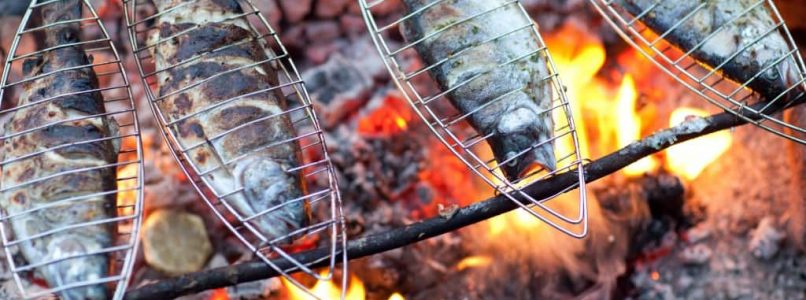Barbecue with a taste of vacation, sea breeze, non-stop relaxation in the comagnia, under fiery skies of sun and stars. We have recently illustrated the rules to follow for an epic barbecue. We talked in particular about the kebabs, the delicious cheeses and the delicious grilled vegetables on the grill. Here are some more tips for when we choose fish as the main food to eat with charcoal.
The cooking on the grill is based on a cooking principle at high temperatures, in which the "heat stroke" forms the crust that keeps the pulp soft and not dry. It really depends on the type of fish we choose, but most of the fish is more delicate than meat, so the coals must tend to be less ardent than what the latter normally requires. Said this, we must not be afraid of heat: the barbecue cooking foresees however a strong heat for all its duration. It is a cooking that is primordial but by no means simple, which requires experience and intuition to be performed to perfection.
Let's start with fish skin, which is essential to protect the meat. If we grill a whole fish, we clean it from the entrails (remembering that, from eggs to liver, the fifth quarter of the sea is gourmet in the kitchen) and we obviously keep the skin. We also leave the scales – unless we have the experience to be able to grill perfectly the scaled skin and then enjoy it together with the pulp. If there is no skin instead (because we are using a slice or a scallop etc), we have to invent it! The meat of the fish should be made in this case marinate (for marinades there is to indulge with bases & aromas, oils & herbs) or at least brushed with oil (the best choice for those who love pure fish). After that we can create an armor by flour or breading: breadcrumbs + spices and aromatic herbs, such as pepper (maybe pink, in grains), lemon or lime peel, coriander, parsley, rosemary, garlic, paprika, cumin etc. A very valid alternative, for those who eat meat, is to wrap the piece of fish in one slice of bacon or lard.
A surprising trick to try? The mayonnaise. For someone's ears it will be music, for others an inaudible suggestion. But here it is: spreading your fish fillets with a thin layer of mayonnaise, thanks to this emulsion they will not stick to the grill and the taste will be much less altered than one would think. On the contrary: if you love mayonnaise, put it on à coté of the poisson once grilled! And if, as we suggest, you want to make it at home with genuine eggs and oil chosen by you, here's the secret to make it perfect!
In order not to attack the fish, it is still essential to place it on the grill only once it is hot. It should be kept in mind the distance of the grill from the embers. A good average can be around 10 cm, but the rule is actually contrary to what would be done initially. In other words, the smaller and not thicker the pieces, the closer they should be to the grid. Larger and fuller fish require a longer cooking time. Therefore they must be kept more distant from the heat source, so that they do not burn outside. The pieces of fish should be brushed with oil or their marinade even during cooking.
Temperature and cooking effects vary depending on the raw material used for combustion. A charcoal & wood combination gives rise to higher temperatures and gives that delicious smoked flavor. If only charcoal is used, the aromatic touch can be given by adding wood chips such as cedar, apple, American walnut, fir or alder.
Cooking times? It certainly depends on the size of the fish. Less is often, the cooking will be short. At 55 ° the meat of the fish remains rosy, while as the temperature increases (up to about 80 ° of cooking on the grill) it gradually becomes whiter. Cutting the skin of the fish with oblique cuts speeds up cooking. If the fish are small, it is not necessary turn them, otherwise do it, but once.
One last tip: if you are a beginner, choose fish with firm and fatty pulp, like sardines (they must be very fresh, strictly for the day, but they cost almost nothing and are an incomparable delight for barbecues), mackerel or tuna (for reasons of ecological justice, white or alalunga is better). Try the eel, for a change. They are a real barbecue treat, and you can't go wrong!
Carola Traverso Saibante
August 2017
updated to July 2019
DISCOVER THE COOKING COURSES OF SALT & PEPE
This recipe has already been read 202 times!
